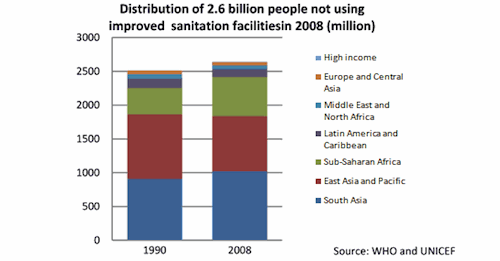Today is World Toilet Day, as designated by the United Nations. The basic idea is improving sanitation for 2.5 billion people, or — phrased another way — if you’re reading this in a nice apartment building/home somewhere in America right now, be aware that worldwide, 1 in 3 people don’t have access to a functioning, safe and private toilet. In fact, sanitation and economic growth are closely tied together. (Some studies have argued that sanitation investments of $1 create ROI of $9.)
There are positive sanitation initiatives underway throughout the world, many detailed here in Forbes. Notable examples include Clean Team, TEECs, Water for People, and WSUP. The Gates Foundation has an entire strategic arm around this project, primarily in south Asia and sub-Saharan Africa.
The Gates Foundation has actually argued for a re-invention of the toilet itself, as shown here:
The latter video and argument is fairly cool. Essentially, ‘flush plumbing’ (which is what most of the developed world knows and understands) requires a massive amount of sub-infrastructure (i.e. pipes). That requires logistics, metal, and running water — and those things aren’t as common in the developing world. What if we could find a way to turn our human waste into oil, gas, fertilizer, or even clean water again? That’s the hope for the ‘toilet of the future.’ In August 2012, Gates held a ‘Reinvent the Toilet Fair’ in Seattle; a team from Cal-Tech won. It’s solar-powered, and it can turn waste into fertilizer (and hydrogen to be used as a backup energy source). Here’s a look at the toilet with Michael Hoffman, who was the principal investigator on the Gates Foundation project:
I haven’t found a ton of information about the toilet’s current rollout progress, but the Huffington Post noted that the winners were given 15 months to figure out a distribution plan; the award was given out in August 2012, so 15 months would be about now. In terms of the broader idea discussed above — the potential for fecal matter to become fuel or energy of some kind — this is a good read, although sewage sludge being burned off can be a large problem (due to toxins being released in the environment).
The running water problem is another major one. It’s possible that only 20 percent of the world’s population has access to running water; demand is going to be 56% higher than supply within about 30 years. In some countries, the situation is approaching drastic levels within a decade; even in the U.S., key aquifers are being tapped out. Without running water, it’s hard for some of these other issues to be addressed. The eight Millennium Development Goals laid out by the United Nations all tie back to water in some way.
A Singapore delegate to the United Nations proposed the idea of ‘World Toilet Day’ and even admitted there’d likely be laughter about it. There has been, in the form of links like this and this. But this is a legitimately serious issue — almost three times as many people have access to cell phones worldwide than have access to toilets; 600 million people in India are purportedly defecating in the open.
This has long been something that bothers me about the world: we spend a lot of time on the projects that bring us money, power, and fame — and not enough time on the projects that could solve some bigger issues (sanitation, even student loans in the developed world). Now, obviously what I just said is a generalization and it also involves elements of how the developed world and the developing world work together and interact with each other, but the broader idea/point is … we should focus on the big issues of our time, and sanitation — directly tied to disease and childhood death — is clearly one of them. World Toilet Day may have a less-than-stellar name from a marketing standpoint, but the issue is crucial.
Here’s a good piece on Toilet Hackers; more context on what they’re doing and how others are working with them to change the world is here:
Another notable company in this field is Sanergy, who works to make sanitation affordable and accessible throughout Africa. Sanergy franchises out the sanitation facilities and helps the local villagers run them as small businesses, as explained in this video:
If you Google “What’s the biggest challenge/problem facing the world today?”, you’ll get a ton of different links and videos and ideas, such as this one. Often, people speak about indifference, or understanding that all humans are still humans, despite religious and ethnic differences, and some people speak about peace and issues like that … but a common theme is health and water and sanitation and education, and many of those things tie back to each other. If we can start by solving a rather basic (you’d think) problem — where do people go to the bathroom? — maybe we could build other solutions on top of that. Hopefully this solar toilet can be made with economies of scale; if it can’t, maybe someone can come along and keep it cheap, or mass-produced. If a group can do for toilets and water what Apple did for a sleek phone in your pocket, we’re all going to be better off, both now and generations hence.

2 Comments
Comments are closed.